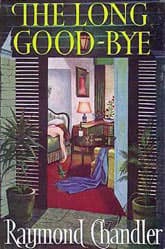The Long Goodbye
Critique • Quotes • Philip Marlowe at the movies
 First edition, 1953
First edition, 1953First publication
1953
Literary form
Novel
Genres
Crime, mystery
Writing language
English
Author's country
United States
Length
Approx. 131,000 words
So long, or too long?
Chandler's longest novel is also his most praised. Which makes me wonder whether it's the length the critics are praising. Or if maybe they think it must be deep since it's so long.
Is The Long Goodbye long because it is saying goodbye to the strictures of the mystery genre and venturing into more mainstream areas of social criticism and psychological analysis? Chandler—that is to say, sleuth Philip Marlowe in the book—certainly seems more cynical than usual about the state of civilization. Even depressed. Is the author in late life perhaps losing patience with his character's limited role? Perhaps starting to doubt whether a slumming angel like Marlowe can have any effect in cleaning up the moral corruption of American big-city life?
Or is Chandler just starting to lose it? There's a loss of focus, a coarsening of sensibility, that seems to afflict aging alcoholic American writers (think late Steinbeck or Hemingway or Fitzgerald). The edge is blunted but the change is often mistaken for the growing subtlety of maturity.
The Long Goodbye is a more sprawling novel than we're used to from Chandler. For much of it, we're not sure what exactly Marlowe is working on, or if he's even working. The detective has had an odd friendship with a rich drunk whom he helps escape to Mexico after the man's nymphomaniac wife is murdered. The man reportedly commits suicide there. Marlowe takes another, seemingly unrelated job finding a missing drunken writer.
He hangs around families related to both cases. He gets hassled by cops. He gets hassled by bad guys. He plays a lot of chess. He meanders about L.A., ruminating. He doesn't seem motivated to actually do anything about what he's thinking though.
Magical finale
Much of the lyricism and sparkling dialogue of earlier Chandler is gone, replaced by a more reflective, even weary—if that's possible—attitude.
But then, when you least expect it, the scattered plot miraculously pulls together.
And then when you expect it even less, it pulls together in a different way. And then again.
Brilliant plotting, or pulling rabbits out of a hat? And who cares? It's breathtaking.
At the end I still have my doubts this is Chandler at the peak of his powers moving in new directions. It still seems to me a general slackening (which becomes even more apparent in his next and final works).
But still it makes for a rewarding reading experience that's different from any crime fiction up to this point.
Having expectations dashed is a good thing, opening the way for new experiences to come. Even if they are to come from other writers.
— Eric
Critique • Quotes • Philip Marlowe at the movies

